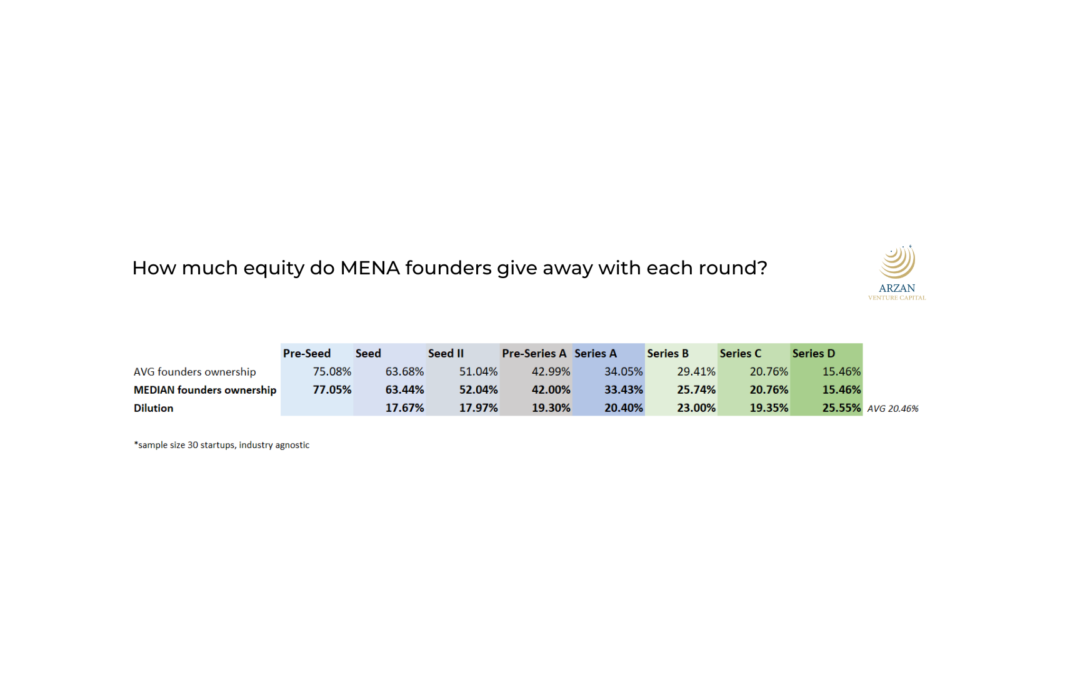Some time ago Hasan Al Shami tagged Arzan VC in his post about the levels of SaaS founders’ equity at IPO – what’s the average ownership% and whether the founders share it equally – and Hasan was wondering if we got some data on MENA founders…
Thank you for the idea, Hasan. We do like good homework summer break or not. 🧮
Founders’ equity at exit (and before it)
Founders’ motivation to conceive and keep building their startups has different fuels. One of them is equity.
My focus here is the equity of not only SaaS founders but MENA founders in general. When I say “founders” – I’m referring to all available founders in one company, so it can mean either solo founders (in case of 1 founder) or a group of co-founders (in case of startups with multiple founders).
In case of multiple founders it’s not a rule that each of them gets the exact same share of equity, and my research will confirm that. The truth is: equality is quite rare and, in case of 2 founders, co-founder A (the lead “founder”) tends to get higher share than co-founder B (and there are similar inequalities among 3/4+ co-founders). For example in the US, only 41% of 2-founder startups split the initial equity equally (50/50).
Let’s have a look at the life of founders’ equity from the startup’s inception until several stages later. Note: MENA exit equity data doesn’t grow on trees, so we’ll have a hint of that + the equity trends before exit.
Founders, it’s all about finding a balance between how much you want to own and how much faster you want the business to grow. Equity decisions should be made early on, before the business is worth a lot. 1% today can one day become few hundred grand, if not few millions. Aim at having a bigger stake for as long as possible although, when the right time comes, higher dilution is a natural course of your equity’s life. Because when the exit comes and you’re left with only a small piece, that 15% you got at exit is probably valued at more than your 50% several stages ago. The pie value changes much faster than your share of pie.
Jason Lemkin’s study of 27 pre-IPO startups showed that 62% of them had founders with equity less than 20%, and the avg. founders’ ownership was 15%, while only 11% had shares less than 10% at the pre-IPO stage.
How much equity do MENA founders give away with each round?
Let’s break it down by stage, and before we do, bear in mind that the sample of companies is diverse in its sectorial make-up and it entails of 30 startups. Most data lie in Pre-Seed to Series B, with only 2 entries per Series C and D.
22 out of the 30 startups (73%) have multiple founders (mostly 2). And only 6 out of those 22 (27%) split the equity equally among the co-founders. Like I wrote earlier, this finding was expected. Not all co-founders contribute equally – moneywise or timewise.
And here’s the dilution% stage by stage, based on the median founders ownership at each stage. The dilution% is pretty much even, with an avg. of ~20%:

I won’t be name-dropping, but one business stands out too loud thanks to its acquisition before Series A, which is quite early in the game. Its 3 co-founders (with equal shares) parked whopping 61% collectively. You can tell this company is an outlier because both average & median for Pre-Series A are in 42s%. I should add that it was a strong exit and each of the co-founders walked away with millions of $ (you need 2 hands to count them).
3 startups reached an exit/IPO stage with an avg. of ~22% in founders’ equity. This pattern matches with the rule of thumb that dictates founders to park no less than 20-30% collectively for themselves at exit (in an ideal world). Some companies may raise 5 rounds and arrive at exit with 20% left, some may raise 7 (including extensions and bridges) and walk away with much less % but much more $ in their pocket if the valuation rose with each round.
For comparison, 3 other startups haven’t yet reached an exit/IPO stage and, contrary to the rule of thumb, their founders are already well-below the 20% threshold. One of them is actually below 10% but that’s still acceptable because: it’s a single founder so he doesn’t have to split his share, the company is beyond Series C, nearing profitability and considering few M&A options.
Final notes:
1. If you’re a founder, get to know the cap table mechanism inside out and don’t think twice about asking for help. We’re here for that. Also, try out some modelling and keep your actual cap table tidy and up to date.
2. Make equity decisions early on.
3. Get familiar with anti-dilution protection to weather down rounds. Just in case.
4. Did I say you should keep your cap table tidy? It helps all the parties.
5. There are no written rules to giving away your equity. Remember: the value of the pie usually changes much faster than your share of it. Here’s to mighty rich pies! (I mean rich in flavour, too :P)
|
TL;DR (too long; didn’t read)
The pie value changes much faster than your share of pie, so equity decisions should be made early on, before the business is worth a lot. I analyzed ownership data of 30 startups (MENA-based, various industries) to see how much equity MENA founders give away with each round: the dilution% is quite even, with an avg. of ~20% at each round.
|
Dook by Taker: 3, 2, 1… launched!
Cartlow’s Nour Sleiman among Forbes’ 20 Women Behind ME Tech Brands
Merit’s footprint across 150+ countries
Mamas & Papas love Citron
Recognized at Seamless: Money Fellows
- Senior DevOps Engineer at Money Fellows (Cairo)
- Senior Software Development Engineer (PHP/LARAVEL) at Cartlow (Cairo)
- Senior Software Engineer (Backend) at Hala (Riyadh)
- DACH Region Sales Head at TruKKer (Berlin)
- Senior Marketing Operations Specialist at Qoyod (Riyadh)
- Commercial Supervisor (Saudi Nationals Only) at Retailo (Riyadh)

Till next month,
Hasan
![]()
![]()
![]()
![]()
![]()
![]() Received this from a kind friend? You can subscribe to our newsletter, too.
Received this from a kind friend? You can subscribe to our newsletter, too.
Copyright © 2023 ArzanVC, All rights reserved.
Want to change how you receive these emails?
You can update your preferences or unsubscribe from this list

